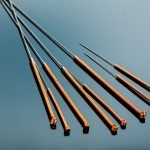Copper Coated Clothing Could Help Reduce Spreading of Infections in Hospitals
Node Smith, ND
Copper Brushed Fabric Could be Healthcare Workers’ Uniforms in the Future
Healthcare practitioners, especially hospital workers, may begin wearing copper uniforms in the future. Uniforms with tiny copper nanoparticles brushed onto the fabric may aid in the reduction of spreading bacterial infections through clothing vectors; infections such as Escherichia coli (E. coli) and Staphylococcus.1
Material Research Scientists Developed a “Durable and Washable, Concrete-like” Composite Complete with Copper Nanoparticles
Material research scientists from the University of Manchester along with universities in China, have developed a “durable and washable, concrete-like” composite that includes copper nanoparticles, which are antibacterial. Binding compounds, such as these, incur antibacterial outcomes has been thought of in the past, however actually attaching the composites to clothing has been a challenge. The researchers at UM developed a method of binding the compound to clothing materials such as cotton and polyester.
Copper is a Good Precious Metal Alternative
Precious metals, such as silver and gold, are great antibacterial and antimicrobial agents, but use in the textile industry has been cost prohibitive. Copper is a good alternative, since it has similar attributes to gold and silver at a fraction of the cost.
polymer surface grafting
The breakthrough technique for combining copper nanoparticles to cotton and polyester is called “polymer surface grafting.” The copper nanoparticles are tethered to the fabric using a polymer brush, which creates a strong chemical bond. The bond is not broken with washing, and is incredibly durable. This means that adding copper nanoparticles to clothing could be a viable option to reduce the spread of hospital spread infections in the future.
Copper Clothing Resistant to Staphylococcus Aureus and E. coli After 30 Washings
The research team found that cotton and polyester brushed-copper clothing was still resistant to Staphylococcus aureus and E. coli, even after 30 washings.
Source:
-
Xuqing Liu. Durable and Washable Antibacterial Copper Nanoparticles Bridged by Surface Grafting Polymer Brushes on Cotton and Polymeric Materials. Journal of Nanomaterials, doi:10.1155/2018/6546193. vol. 2018, Article ID 6546193, 2018.
Image Copyright: <a href=’https://www.123rf.com/profile_pixelman’>pixelman / 123RF Stock Photo</a>
 Node Smith, ND, is a naturopathic physician in Portland, OR and associate editor for NDNR. He has been instrumental in maintaining a firm connection to the philosophy and heritage of naturopathic medicine among the next generation of docs. He helped found the first multi-generational experiential retreat, which brings elders, alumni, and students together for a weekend camp-out where naturopathic medicine and medical philosophy are experienced in nature. Four years ago he helped found the non-profit, Association for Naturopathic ReVitalization (ANR), for which he serves as the board chairman. ANR has a mission to inspire health practitioners to embody the naturopathic principles through experiential education. Node also has a firm belief that the next era of naturopathic medicine will see a resurgence of in-patient facilities which use fasting, earthing, hydrotherapy and homeopathy to bring people back from chronic diseases of modern living; he is involved in numerous conversations and projects to bring about this vision.
Node Smith, ND, is a naturopathic physician in Portland, OR and associate editor for NDNR. He has been instrumental in maintaining a firm connection to the philosophy and heritage of naturopathic medicine among the next generation of docs. He helped found the first multi-generational experiential retreat, which brings elders, alumni, and students together for a weekend camp-out where naturopathic medicine and medical philosophy are experienced in nature. Four years ago he helped found the non-profit, Association for Naturopathic ReVitalization (ANR), for which he serves as the board chairman. ANR has a mission to inspire health practitioners to embody the naturopathic principles through experiential education. Node also has a firm belief that the next era of naturopathic medicine will see a resurgence of in-patient facilities which use fasting, earthing, hydrotherapy and homeopathy to bring people back from chronic diseases of modern living; he is involved in numerous conversations and projects to bring about this vision.










